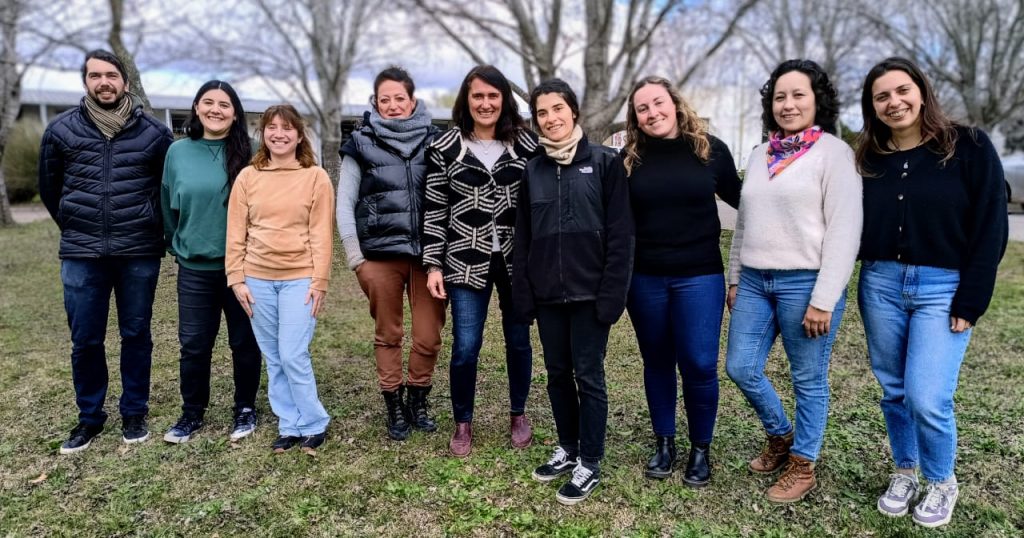- Anaerobic Parasite
- Aquatic Ecology
- Abiotic and biotic stress in plants
- Biochemistry and Physiology of Fruit Ripening
- Bovine and Ovine Biotechnologies
- Cell Biology and Biochemical Parasitology
- Comparative Neuroendocrinology
- Developmental Biology
- Environmental Microbial Ecology Laboratory
- Ichthyophysiology and Aquaculture
- Microorganism Plant Interactions
- Molecular Farming and Vaccines
- Molecular Parasitology
- Mycology and Edible Fungi
- Physiology and Assistance to Plant Breeding
- Phytobacteriology
- Photochemistry and Molecular Photobiology
- Plant Physiology
- Soil Microbiology
- Stem Cells and Gene Therapy
Anaerobic Parasite Laboratory
Directors

- Natalia de Miguel, PhD - Independent Researcher CONICET. Adjunct Professor UNSAM ndemiguel@intech.gov.ar
- Verónica Cóceres - Independent Researcher CONICET. Teaching Assistant UNSAM coceres@intech.gov.ar
Members
- Ing. Lucrecia Iriarte - Posdoctoral Fellow CONICET luiriarte@intech.gov.ar

- Ing. Daniela Muñoz - Doctoral Fellow CONICET daniim397@gmail.com

- Lic. Manuela Blasco Pedreros - Doctoral Fellow CONICET manuelablasco@intech.gov.ar

- Cristian Martínez, Doctoral fellow Scientific and Technological Promotion Agency cmartinez@intech.gov.ar

- Agustina Prat - Doctoral fellow Scientific and Technological Promotion Agency aprat@intech.gov.ar

- Josefina Seifert - Doctoral Fellow AGENCIA I+D+i jseifert@intech.gov.ar
- Tca. María Florencia Irigoyen - Personal de Apoyo CONICET mirigoyen@intech.gov.ar
Research Lines
The goal of our laboratory to shed light on the pathogenesis process of two anaerobic parasites for which little biological information is available: Trichomonas vaginalis, the most prevalent, non-viral, sexually-transmitted infection worldwide; and Tritrichomonas foetus; an important pathogen of the bovine reproductive tract.
- Investigating new aspects of the mechanisms and biological functions of epigenetic in Trichomonas vaginalis. Specifically, we analyze the role of DNA methylation and histone modifications in gene expression, 3D chromatin structure and parasite pathogenesis. We aim to gain insight into how parasites use epigenetics as an adaptive strategy to survive under different conditions of their human host.
- The ability to communicate is essential for all living cells. The release of extracellular vesicles (EVs) have emerged as a new mode of cell communication. We aim to gain a better understanding on how the parasite sorts EVs cargo and releases, as well as investigating its function as effectors in the interaction of vaginalis with host cells.
- Our investigation involves the characterization of cell division process to explore alternative therapeutic targets. Its known that the functional analysis of the regulatory proteins involves in cell division process in pathogenic microorganisms is relevant for new therapeutic strategies design. As there are no efficient chemotherapeutic agents against bovine trichomonosis to date, our laboratory propose to study foetus cell division regulatory proteins to understand their functionality and identify possible future therapeutic targets.
- Diagnosing foetus-infected bulls is complicated. Specificity and sensitivity may be compromised by many factors such as sample collection, testing conditions and the presence of non-pathogenic trichomonads in the samples. In this context, our objective is to design an inexpensive and easy to handle alternative diagnostic test with high specificity and sensibility.
Publications
Muñoz D, Lizarraga A, Johnson PJ, Strobl-Mazzulla PH, de Miguel N. Influence of DNA methylation and chromatin accessibility on regulation of gene expression during Trichomonas vaginalis-host cell interaction. American Society for Microbiology Journals 17, 1. 2026. https://doi.org/10.1128/mbio.03175-25
de Miguel N, Touz MC, Blasco Pedreros M, Luna Pizarro G. Understanding cell communication among protozoan parasites. Molecular Microbiology. En prensa. 2025. https://doi.org/10.1111/mmi.70005
Muñoz D, Lizarraga A, Johnson P, Strobl-Mazzulla PH, de Miguel N. Influence of DNA methylation and chromatin accessibility on regulation of gene expression during Trichomonas vaginalis-host cell interaction. American Society MIcribiology. mBio 0:e03175-25.2025. https://doi.org/10.1128/mbio.03175-25
Prat A, Muñoz D, Lizarraga A, Seifert-Gorzycki J, Sanchez-Vazquez E, Johnson PJ, Strobl-Mazzulla PH, de Miguel N. Chromatin accessibility and gene expression in the parasite Trichomonas vaginalis. BMC Infectious Diseases 25, 1365. 2025. https://doi.org/10.1186/s12879-025-11808-3
Blasco Pedreros M, Salas N, dos Santos Melo T, Miranda-Magalhães A, Almeida-Lima T, Pereira-Neves A, de Miguel N. Role of a novel uropod-like cell membrane protrusion in the pathogenesis of the parasite Trichomonas vaginalis. Journal of Cell Science 137. 2024. https://doi.org/10.1242/jcs.262210
Rivero MB, Alonso AM, Abdala ME, Luque ME, Carranza PG, Coceres VM, Rivero FD. Comparative membrane proteomic analysis of Tritrichomonas foetus isolates. Scientific Reports 14, 17033. 2024. https://doi.org/10.1038/
Iriarte L, Martínez CI, de Miguel N, Cóceres V. Tritrichomonas foetus cell division involves DNA endoreplication and multiple fissions. Microbiology Spectrum11, e03251-22. 2023. https://doi.org/10.1128/spectrum.03251-22
Martínez Cristian I, Iriarte LS, Salas N, Alonso AM, Pruzzo CI, dos Santos Melo T, Pereira-Neves A, de Miguel N, Cóceres VM. Prolonged survival of venereal Tritrichomonas foetus parasite in the gastrointestinal tract, bovine fecal extract, and water. Microbiology Spectrum e00429-23. 2023. https://doi.org/10.1128/spectrum.00429-23
Salas N, Blasco Pedreros M, dos Santos Melo T, Maguire VG, Sha J, Wohlschlegel JA, Pereira-Neves A, de Miguel N. Role of cytoneme structures and extracellular vesicles in Trichomonas vaginalis parasite: parasite communication. Elife 12:e86067. 2023. https://doi.org/10.7554/eLife.86067
Alonso AM, Schcolnicov N, Diambra L, Cóceres MV. In‑depth comparative analysis of Tritrichomonas foetus transcriptomics reveals novel genes linked with adaptation to feline host. Scientific Reports 12,10057. 2022. https://doi.org/10.1038/
Edreira MM, Francia ME, de Miguel N. Editorial: Host/Parasite molecular and cellular interactions in the establishment and maintenance of protozoan infections. Frontiers in Cellular and Infection Microbiology 12, 930073. 2022. https://doi.org/10.3389/fcimb.
Salas N, Cóceres MV, dos Santos Melo T, Pereira-Neves A, Maguire VG, Rodriguez T, Sabatke B, Ramirez MI, Sha J, Wohlschlegel JA, de Miguel N. VPS32, a member of the ESCRT complex, modulates adherence to host cells in the parasite Trichomonas vaginalis by affecting biogenesis and cargo sorting of released extracellular vesicles. Cellular and Molecular Life Sciences 79, 11. 2022. https://doi.org/10.1007/
Cóceres MV, Iriarte LS, Miranda- Magalhães A, Santos de Andrade TA, de Miguel N, Pereira-Neves A. Ultrastructural and functional analysis of a novel Extra-Axonemal structure in parasitic Trichomonads. Frontiers in Cellular and Infection Mircrobiology 11, 757185. 2021. https://doi.org/10.3389/fcimb.2021.757185
Lizarraga A, Muñoz D, Strobl-Mazzulla PH, de Miguel, N. Toward incorporating epigenetics into regulation of gene expression in the parasite Trichomonas vaginalis. Molecular Microbiology 115: 959–967. 2021. https://doi.org/10.1111/mmi.14704
Sabatke B, Gavinho B, Coceres V, de Miguel N, Ramirez MI. Unveiling the role of EVs in anaerobic parasitic protozoa. Molecular Immunology 133, 34-43. 2021. https://doi.org/10.1016/j.molimm.2021.02.007
Lizarraga A, Klapholz O’Brown Z, Boulias K, Roach L, Greer E, Johnson PJ, Strobl-Mazzulla, PH, de Miguel N. Adenine DNA methylation, 3D genome organization and gene expression in the parasite Trichomonas vaginalis. Proceedings of the National Academy Sciences of the United States of América 117, 13033-13043.2020 https://doi.org/10.1073/pnas.1917286117




